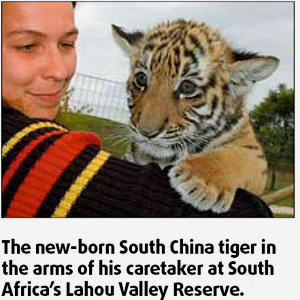What do you call the result of a union between Tiger Woods and Cathay?
No, there is no business deal between the world's best golfer and the Hong Kong-based airline. At issue is a name for the first South China tiger born outside the country.
On November 23, three-year-old Tiger Woods and four-year-old Cathay gave birth to their first son at South Africa's Lahou Valley Reserve, set up by Quan Li, a Beijing native and founder of UK-based Save China's Tigers, to release China's tigers into the wild.
Quan called the birth of the male cub, temporarily known as Tiger Woods Junior, "a truly historic event because it is the first time a South China tiger has been born outside the country".
Save China's Tigers is soliciting names for the cub from across the world. The charity organization aims to raise public awareness of the imperative to save the tiger and to gain further support to protect and reintroduce the endangered species to the wild.
From today, those interested can submit suggested names or vote for their favorites online on http://news.sina.com.cn/z/tigername2008/ (Chinese) or www.savechinastigers.org (English).
According to Quan, the name should reflect the culture and identity of the species.
Native to China, the South China tiger is also known as Amoy tiger or Panthera tigris amoyensis. With fewer than 30 in the wild and about 60 in zoos, some major conservation groups have written it off as "functionally extinct".
Quan, a former fashion executive, however, refuses to call it quits. After an ecotourism trip to Zambia, Quan, who formerly headed Gucci's worldwide licensing business, decided to focus on saving the big cats. In 2000, she launched Save China's Tigers.
Her ambitious plan, to reintroduce tigers that can hunt and survive in the wild, has so far cost about $10 million, provided largely by her husband, an investment banker. She used the money to establish Lahou Valley Reserve, about 600 km south of Johannesburg.
Since 2003, four tigers, including Tiger Woods and Cathay, have undergone rewilding training at the reserve. They have learnt to cope with the elements and to catch a variety of prey from wild guinea fowl to hares - as well as reproduce.
Over the past two months, the male cub has demonstrated more wild instincts than his counterparts back in China's zoos, according to Quan.
In a real-time video interview yesterday, the cub appeared healthy and playful. Soon after his milk feed, he was trying to pull away and chew at the nursing expert's clothes. At one time, he threw away a toy and chased after it.
According to the caretaker, his weight has grown from 1.2 kg at birth to 7.5 kg. He drinks 600 ml of milk and has two meals of chicken each day. He is scheduled to have his first vaccination shot next week and another two at an interval of four weeks. After that, he is expected to join his parents at the preserve.
Quan said she hopes the cub's parents teach him the hunting skills they have learned over the past three to four years since their arrival at the preserve.
"With the birth of this cub, the project is entering a brand new stage," Quan said. "But there is still a long way to go since the ultimate goal is actually to introduce the Chinese tigers back to where they came from - the Chinese wild."
According to Lu Jun, deputy research fellow at the national wildlife research and development centre affiliated to the State Forestry Administration, the country has been preparing to establish a reserve for the eventual return of rewilded tigers.
Two places, Zixi in Jiangxi, and Liuyang in Hunan, have been recommended, Lu said.
According to Quan, it will cost at least $4 million for the first phase of the reserve, and US$20 million to fully recreate an ecosystem that's ideal for the survival of the South China tiger.
(China Daily January 22, 2008)






